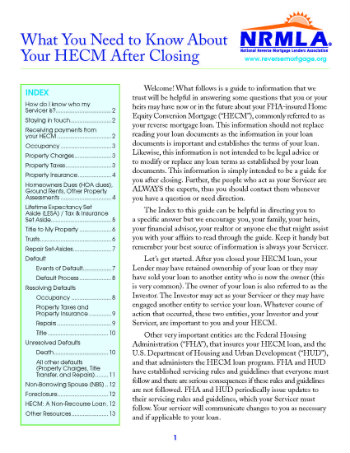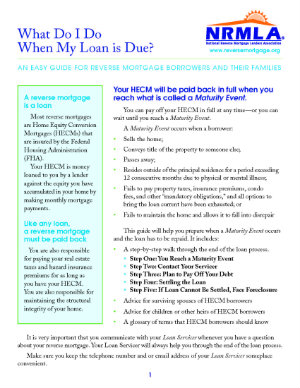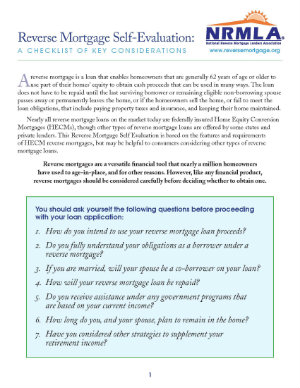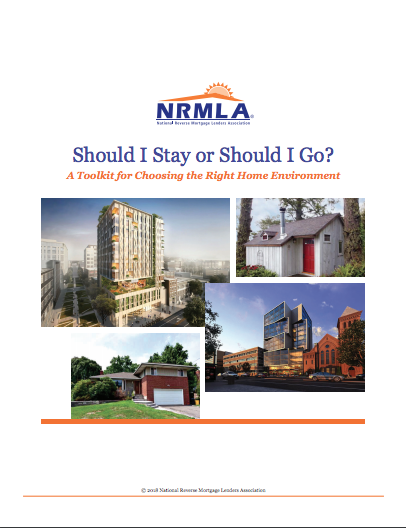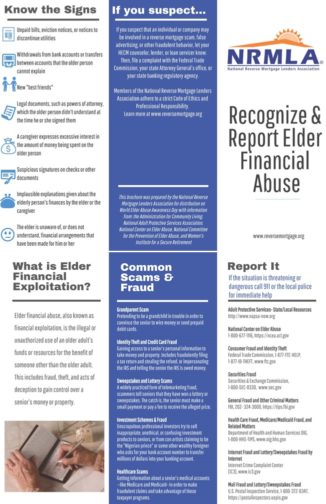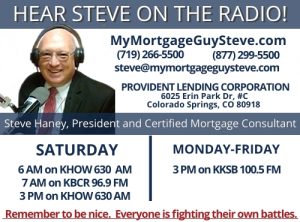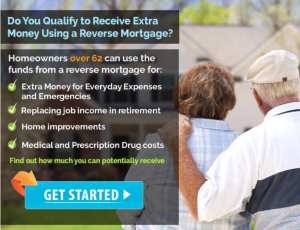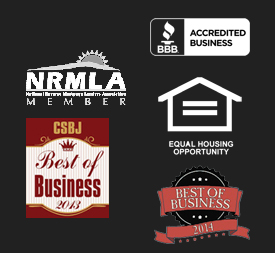The NRMLA (National Reverse Mortgage Lender’s Association) has created guides and resources for consumers who are interested in learning more about reverse mortgages. These are good references for borrowers and their families, who have questions about the rules, guidelines and timelines that apply to their loans.
You may download and use the following brochures from this page:
What you Need to Know About your Reverse Mortgage After Closing
The National Reverse Mortgage Lenders Association created, “What You Need to Know About Your HECM After Closing” to answer questions reverse mortgage loan borrowers, and their heirs, may have about their FHA-insured Home Equity Conversion Mortgage, commonly referred to as a reverse mortgage loan. This free guide explains the important role of the Loan Servicer and the rules, guidelines, and timelines that apply to the loan.
The index to this free downloadable guide can be helpful in directing you to a specific answer but we encourage you, your family, your heirs, your financial advisor, your real estate agent, or anyone else that might assist you with your affairs to read through the guide. Keep it handy but remember your best source of information is always your Servicer.
The following information is covered in the guide:
- How do I know who my Servicer is?
- Staying in touch
- Receiving payments from your HECM
- Occupancy
- Property Charges
- Property Taxes
- Property Insurance
- Homeowners Dues (HOA dues), Ground Rents, Other Property Assessments
- Lifetime Expectancy Set Aside (LESA) / Tax & Insurance Set Aside
- Title to My Property
- Trusts
- Repair Set-Asides
Default
- Events of Default
- Default Process
Resolving Defaults
- Occupancy
- Property Taxes and Property Insurance
- Repairs
- Title
Unresolved Defaults
- Death
- All other defaults (Property Charges, Title Transfer, and Repairs)
- Non-Borrowing Spouse (NBS)
- Foreclosure
- HECM: A Non-Recourse Loan
- Other Resources
What do I do when my Reverse Mortgage Loan is Due?
The National Reverse Mortgage Lenders Association created, “What Do I Do When My Loan is Due?,” to walk reverse mortgage loan borrowers and their families through the end of the loan process when it is time for the loan to be repaid.
This guide will help your family prepare when a Maturity Event occurs and the loan has to be repaid.
It includes:
- A step-by-step walk through the end of the loan process.
- Step One: You Reach a Maturity Event
- Step Two: Contact Your Servicer
- Step Three: Plan to Pay Off Your Debt
- Step Four: Settling the Loan
- Step Five: If Loan Cannot Be Settled, Face Foreclosure
- Advice for surviving spouses of HECM borrowers
- Advice for children or other heirs of HECM borrowers
- A glossary of terms that HECM borrowers should know
A maturity event occurs when a borrower:
- Sells the home
- Conveys title of the property to someone else
- Passes away
- Resides outside of the principal residence for a period exceeding 12 consecutive months due to physical or mental illness
- Fails to pay property taxes, insurance premiums, condo fees, and other “mandatory obligations,” and all options to bring the loan current have been exhausted
- Fails to maintain the home and allows it to fall into disrepair
Reverse Mortgage Self-Evaluation: A Checklist of Key Considerations
Reverse mortgages are a versatile financial tool that nearly a million homeowners have used to age in place, and for other reasons. However, like any financial product, reverse mortgages should be considered carefully before deciding whether to obtain one.
The National Reverse Mortgage Lenders Association’s free Reverse Mortgage Self-Evaluation: A Checklist of Key Considerations poses seven questions and important considerations interested consumers should ask themselves, and think about, before proceeding with a loan application.
1. How do you intend to use your reverse mortgage loan proceeds?
One of the advantages of a reverse mortgage loan is that borrowers generally have the freedom to use their cash proceeds any way they choose. Eligible homeowners obtain reverse mortgages for many reasons.
Reverse mortgage loans are most successful when borrowers have a plan to ensure the money supports and sustains them for as long as they want to stay in their home. Additional consumer protections were put into place in 2013 to help borrowers preserve more of their home equity during the first year of the loan.
Do you have a plan for making your reverse mortgage loan proceeds last?
2. Do you fully understand your obligations as a borrower under a reverse mortgage?
Reverse mortgage borrowers are not required to make monthly loan payments to their lender, but must continue to meet certain obligations in order to stay current on the loan. Failure to meet these obligations may result in the loan becoming due and payable.
- Will you live in your home for the majority of the calendar year?
- Are you prepared to maintain the condition of your property?
- Will you be able to pay your property taxes, insurance, and homeowner fees?
- Do you understand what will happen if you cannot pay your taxes, insurance, or homeowner fees?
- Do you understand your personal finances will be reviewed?
3. If you are married, will your spouse be a co-borrower on your loan?
Under the rules of a HECM reverse mortgage, borrowers must be at least 62 years old, named on the title of the home, and use the home as their principal residence. Spouses who do not meet these criteria cannot sign the HECM reverse mortgage loan documents as a borrower and will be identified as either an eligible non-borrowing spouse or an ineligible non-borrowing spouse depending on certain additional criteria. You should speak to your HUD-approved reverse mortgage counselor about the non-borrowing spouse criteria.
- What if your co-borrower spouse survives you?
- What if your eligible non-borrowing spouse survives you?
- What if your ineligible non-borrowing spouse survives you?
4. How will your reverse mortgage loan be repaid?
A reverse mortgage is a non-recourse loan which means that the borrower or the borrower’s estate will never be obligated to pay the lender more than the loan balance or the current value of the home, whichever is less. When a loan is called due and payable, the reverse mortgage borrower or the borrower’s estate only needs to repay the lesser of either the loan balance or 95% of the home’s appraised value at that time.
- Do you know your options for repaying the loan?
- Do you want someone to inherit your home after you pass away?
- Did you know that you can prepay your reverse mortgage loan?
5. Do you receive assistance under any government programs that are based on your current income?
A reverse mortgage does not affect regular Social Security or Medicare benefits. However, if you are on Medicaid or receive Supplemental Security Income (SSI), reverse mortgage proceeds may affect your benefits.
Are you considering a lump sum cash draw?
6. How long do you, and your spouse, plan to remain in the home?
Reverse mortgages, like many financial products, have costs associated with them, including some that need to be paid up-front when the reverse mortgage is obtained. Among other things, that means that if you or your spouse are not likely to continue to live in your home for more than several years after the reverse mortgage is obtained, you should pay particular attention to those costs and consider them carefully with your HUD-approved reverse mortgage counselor and whether there may be other more cost effective alternative strategies.
7. Have you considered other strategies to supplement your retirement income?
- Do you qualify for public or private benefits available to low-income people with Medicare?
- Did you know there are other ways to tap your home equity?
Reverse Mortgage Self-Evaluation: A Checklist of Key Considerations is a good guide for you and your family to help decide if a reverse mortgage is right for you.
Choosing the Right Home Environment
This consumer toolkit from the National Reverse Mortgage Lenders Association will help older homeowners consider whether their current home environment will best serve their needs as they age. NRMLA’s toolkit guides readers through a wide selection of housing possibilities.
As reverse mortgage professionals and members of the National Reverse Mortgage Lenders Association, we educate consumers about using their home equity to help finance retirement. But, not everyone can qualify for a reverse mortgage, and not everyone is in the best home setting to serve their needs as they age. Where older adults choose to age requires consideration of functionality, location, availability of services and affordability.
NRMLA’s toolkit for choosing the right home environment, Choosing the Right Home Environment, provides an overview of:
- Single Family Housing
- Home Modification
- Multifamily Housing
- Senior Rental Housing
- Continuing Care Retirement Communities (CCRCs)
- Affordable Senior Housing
- Assisted Living
- Nursing Homes
- Veterans Housing
- Special Needs: Mental Health Housing
- Getting Smaller: Granny Housing & Microunits
- Shared Housing
- Other Creative Solutions
Recognize & Report Elder Financial Abuse
A new consumer brochure from the National Reverse Mortgage Lenders Association helps seniors and their loved ones recognize common scams and signs of financial exploitation. The free resource also includes contact information for government authorities and victim support organizations.
Download & Print the Trifold Brochure:
- Save the PDF to your computer
- Print two sided, Portrait, flip on short edge
Elder financial abuse, also known as financial exploitation, is the illegal or unauthorized use of an older adult’s funds or resources for the benefit of someone other than the older adult. This includes fraud, theft, and acts of deception to gain control over a senior’s money or property.
Each year, an estimated five million, or one in ten, older Americans are victims of elder abuse, neglect or exploitation. Financial abuse costs older Americans more than $2.6 billion dollars annually.
Common signs of elder financial abuse include unpaid bills, eviction notices, or notices to discontinue utilities; withdrawals from bank accounts or transfers between accounts that the older person cannot explain; new “best friends;” and a caregiver who expresses excessive interest in the amount of money being spent on the older person.








